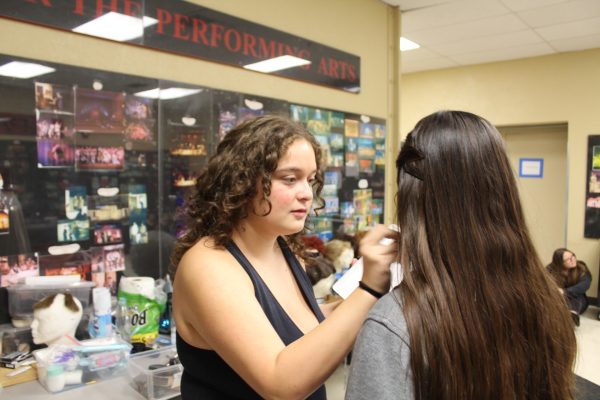Last weekend, the Academy for the Performing Arts (APA) closed its production of “Les Miserables” with the help of its various departments, including musical theater and tech. APA productions, whether it be musical theater, acting, or the Music Media Entertainment Technology program (MMET), require weeks of hard work, stress, and time-consuming rehearsals to get the show to its final form. Many people don’t understand the challenges the cast and crew face throughout a musical like “Les Miserables.” The audience watched the tragic story unfold over two weekends.
Les Miserables tells the story of Jean Valjean, an ex-criminal in France during the first half of the 19th century. Valjean was imprisoned for 19 years for a petty crime, escaped his parole, and has been hiding from the story’s main antagonist, Javert, for years. This musical requires lots of movement, massive sets and intricate props. APA’s technical theater department plays a significant role in the story-telling aspect.
“Actors on stage singing and acting [without scenery] just feels naked,” said Zoe Carser, a senior in their 4th year at APA, who was both the props master and the set designer. “If we don’t do sets… it’s going to be so empty.”
After a run-in with a local Bishop, Jean Valjean decides to live the rest of his life in disguise. He becomes a factory owner and adopts a little girl named Cossette, the daughter of one of his poorest workers, Fantine. Cossette previously lived with the Thenardiers, a family of innkeepers and thieves, along with their daughter Eponine—who was influenced by her parents to neglect Cossette and treat her like a servant.
“Although she’s the villain, she’s kind of funny and likable,” said Rosy Martin, one of the two APA students who play Madame Thenardier. “She has these funny moments that I feel like the audience can really resonate with.”
APA’s Costume Department provides the cast with hair, makeup, and wardrobe to accurately bring a show like this to life. Madison Grossman, a senior at APA who did most of the makeup and hair for Les Miserables, was working non-stop the whole show. “We are on our feet, running around trying to make sure we keep the show running smoothly, which is stressful and definitely keeps us outside of our comfort zones”.

Everyone involved in a musical theater production must face various trials and tribulations to get the show up and running. The week before opening night, called “tech week,” is arguably the most stressful week during a performance. Many students have found it challenging to balance APA and homework during this week.
“I’ll find a time where I’m not being used during rehearsal, and I’ll try to do it there… but I don’t want to do it too much to the point where I take myself out of the Les Mis world,” said Martin.
A common saying in the theater world is, “There are no small parts in a show.” While it is a cliché, it still proves to be true. Whether you’re performing on stage, playing the music in the orchestra pit, or turning on the microphones in the balcony, everyone is an essential part of the production.
In conclusion, people put so much effort into these productions because they love what they do. Even though there can be a lot of stress and anxiety, it’s always worth it in the end. “Working backstage is really rewarding,” said Grossman, “but once the show finishes, it makes all [the] long hours worth it”.
If you missed the show, don’t fret! There will be two more musicals this year, including “Mamma Mia” and “Crazy For You”. For more information on upcoming performances, check out the HBAPA website.








